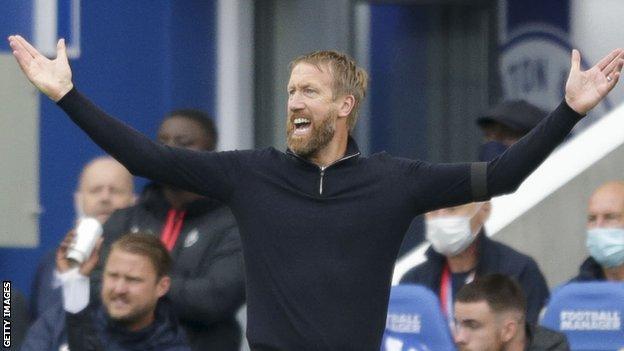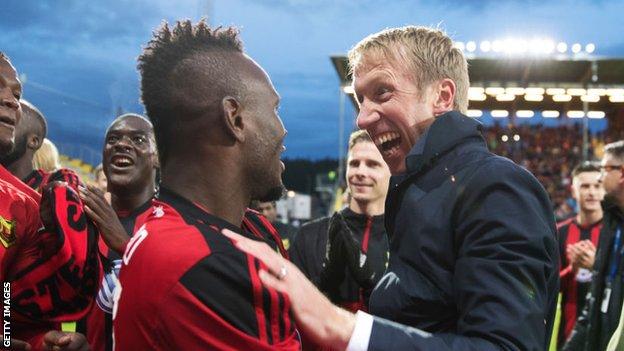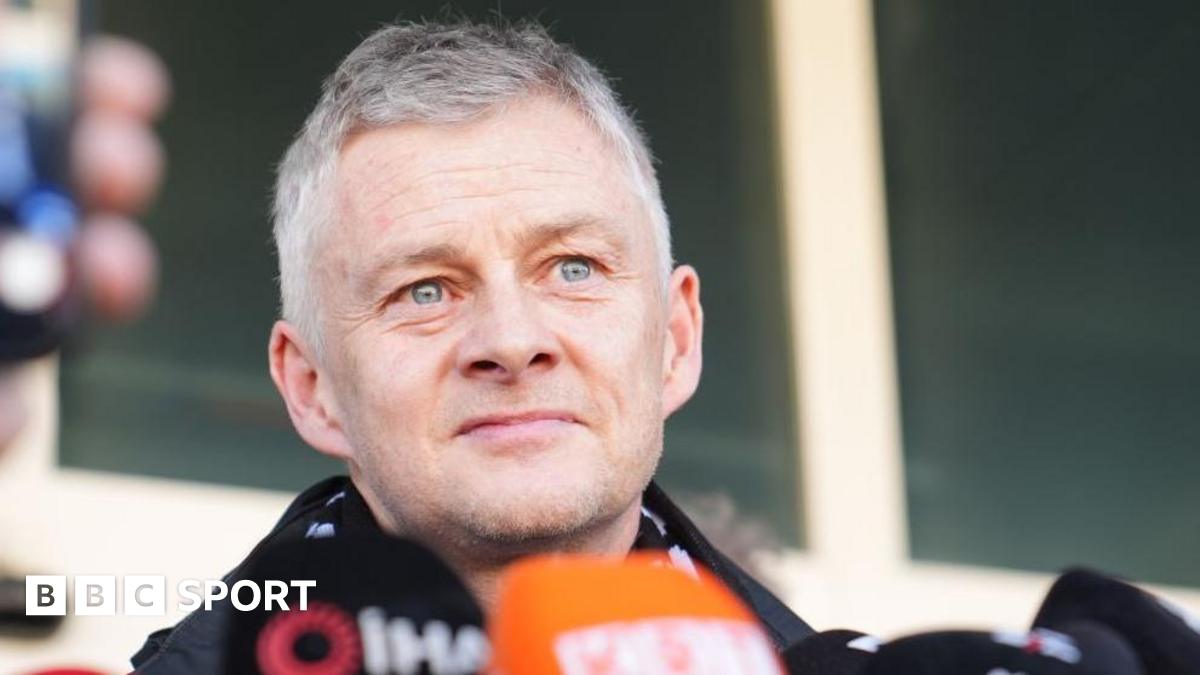ARTICLE AD BOX
 Brighton are fifth in the Premier League and will go into the top four if they cause an upset and win at Liverpool on Saturday
Brighton are fifth in the Premier League and will go into the top four if they cause an upset and win at Liverpool on SaturdayA remote club in the fourth tier of Swedish football was not the ideal starting point for an aspiring manager, but Graham Potter was just grateful for the opportunity.
It was a leap into the unknown and he could have sunk without trace. Instead, Potter guided Ostersunds FK to three promotions in five seasons, followed by a first major trophy and a spot in the Europa League.
His prospects were transformed beyond recognition.
Douglas Bergqvist, a young defender who had lost his way in the English system, had his career revived by Potter after leaving Exeter City to join Ostersund in February 2014.
"I didn't really feel I was getting my due. The first conversation I had with Graham, he basically sold me the dream. They were in the second tier and maybe it was a far-fetched plan, but it all came true," says Bergqvist.
"I don't think it will be replicated in Swedish football, especially of that magnitude and how quick it all went."
Bergqvist was one of several players who had grown disillusioned with a lack of progress, embracing the possibility of a fresh start in Sweden. Potter made them feel valued in a way others hadn't.
"A lot of us were lost, doubted, rejects. He loved a turnaround story and changing people for the better. He's someone who changed, not just my football career, but my life. I became a more mature and respectful human being. He cared more about you as a person than your football skills."
Thoughtful and compassionate, Potter helped to create a supportive culture at Ostersund, where people were encouraged to be open with each other. It was a stark contrast to the mentality of an old-fashioned English dressing room.
"Moving away from home, some things were difficult off the pitch," explains the 28-year-old. "He was very big on helping on the mental health side. It wasn't talked about as much then as it is nowadays. He helped me and a lot of other boys.
"We had a very good environment. No matter how good you were as a footballer, if you didn't fit into the group then he found a different solution for you. No player was bigger than the team."
Bergqvist forged a close relationship with Potter and they've stayed in touch. At the end of his second season with the club, Ostersund won promotion to the top division for the first time.
They weren't overawed and continued to play on the front foot, controlling games against teams with much greater resources. In April 2017, they won the Swedish Cup.
"We played a very possession-based type of football. Very methodical and forward-thinking. It was high risk, but high reward," says Bergqvist.
"He was just two, three, four steps ahead. He always knew what the opposition were going to do. He played different systems and was able to change personnel. He was a tactical genius."
Ostersund shot to prominence with their run to the last 32 of the Europa League, which included positive results against Galatasaray, Hertha Berlin and Athletic Bilbao. They were eventually knocked out by Arsenal, despite winning 2-1 at Emirates Stadium.
 Potter led Ostersund to the most successful period in their history
Potter led Ostersund to the most successful period in their historyThat summer, Potter took over at Swansea City, who were looking to rebuild on their return to the Championship. He was still relatively unknown in the UK, but quickly won over his new players.
"We had a big meeting and I remember his exact words were 'this isn't a dictatorship'," says striker Oli McBurnie. "He wanted to help us as much as we'd help him. He wanted to help you improve as much as a person as he did as a player. I'd never really had that from any manager before.
"The club had just been relegated and a few big names had gone. It was a bit up in the air. He brought in a lot of players from the under-23s. He was really keen on developing players. If they earned the opportunity to play, he was more than happy to give it to them."
McBurnie was one of the biggest beneficiaries. After three years on the fringes he was entrusted to lead the line for the Swans and enjoyed the best season of his career, scoring 24 goals in 44 games.
"He's the best manager I've ever had on a personal level, by far. He cared so much about your wellbeing. Football's a results-based business and you're almost seen as pieces of meat sometimes. He went the extra mile to help me with things he didn't have to," recalls the Scottish striker.
"He had a lot of trust in me. He gave me that opportunity and gave me the confidence throughout the whole season to just keep going. The way we played football definitely suited me as well."
Potter restored Swansea's identity as a passing team, which had served them so well on their rise through the divisions. He encouraged his players to be brave and stick to the plan.
"He cared so much more about the performance than the result," adds McBurnie. "I remember one game at Nottingham Forest. We lost 2-1 but we'd absolutely battered them. He was happier with that than games where we'd got a result but hadn't played the way he wanted.
"His philosophy was that if you get the performance right, then more times than not the result would look after itself. It was a breath of fresh air."
Potter's sole season in charge ended with a 10th-placed finish, nine points shy of the play-offs. His side were entertaining to watch but hit their stride too late to challenge. Before they could build on that, the Premier League came calling.
"Everyone in that Swansea team thought he'd do well at Brighton," says McBurnie. "He plays football the right way. He has the right outlook on football and life. He's such a good person that boys will always play for him. They're great ingredients for a manager."
Brighton had been at constant threat of relegation for the previous two seasons. When Potter replaced Chris Hughton in May 2019, he was tasked with pushing them up the table while introducing a more adventurous style of play.
"I was impressed with how he saw the game and how he liked to play," says Dale Stephens, who has since joined Burnley. "He took over a team that was really good defensively but probably lacked a little bit going forward.
"He wasn't going to change everything within two weeks. He knew it was going to be a process, but from early on you could see where he wanted the team and the club to go."
Throughout pre-season, Potter worked to implement a more fluid attacking system. On the opening day, everything came together at Vicarage Road, giving an early indication of what this revamped Brighton were capable of.
"We had all these new ideas and they're obviously going to be tested in the first game," Stephens recalls. "We went to Watford and won 3-0. That breeds belief within the team that we're doing the right things and we're on the right track."
When Brighton's form dipped, the players never panicked. Potter's belief was unwavering and his preparation as thorough as ever.
"There was no stone left unturned," says the midfielder. "From Monday morning, you knew your job clearly. He'd challenge you every week. You could be playing one system one week and then a different system the week after.
"He'd study a team with his backroom staff, and we'd have a clear plan. He didn't leave anything to chance. You could still lose, but he had a logical idea and gave it everything in terms of regular video meetings and showing clips of what he wanted."
Potter had enjoyed success with younger, more impressionable players at Ostersund and Swansea. Brighton had a more experienced squad, but they responded to his approach with the same enthusiasm.
"I was 30 years old and was still learning a lot about the game," adds Stephens. "He's whetted my appetite for becoming a manager. "I really enjoyed working with him. No matter who you played against, he had a plan."
The Seagulls finished 15th and 16th, with the same points tally, in the past two seasons, but their performances always gave them the belief that results would improve. Now they have and Brighton are flying high in fifth place going into Saturday's Premier League trip to Liverpool.
Although Potter, 46, is thriving at Brighton, many believe he has the potential to go even further. Several of his former players see him as a future England manager.
"I wouldn't say anything's too big for him. I could see him taking over the England job one day - he can go all the way. The only thing is if people at the top level are willing to buy into him and his vision," says Bergqvist.
"At Swansea, we all said we could see him being England manager," agrees McBurnie. "We believed in him that much. I honestly think he could go as high and as far as he wants. I don't think there's much that could stop him."

- Our coverage of Brighton & Hove Albion is bigger and better than ever before - here's everything you need to know to make sure you never miss a moment
- Everything Albion - go straight to all the best content


 3 years ago
33
3 years ago
33








 English (US) ·
English (US) ·